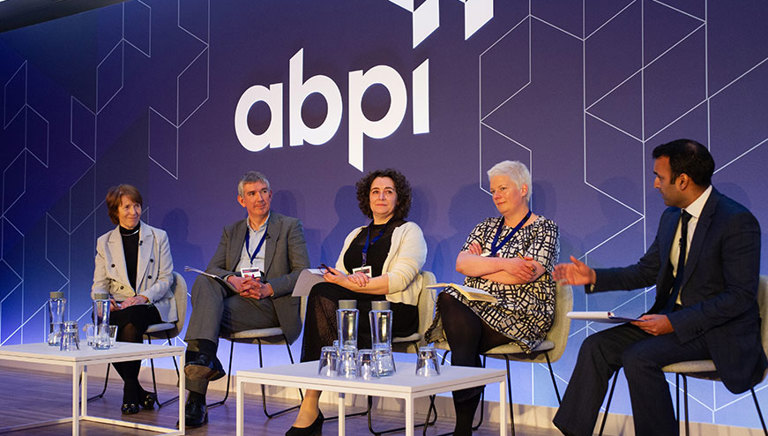ABPI conference panel session: improving the health and productivity of the whole of the UK
At the ABPI Conference 2023, the second panel session focussed on improving the health and productivity of the whole of the UK.
Speaking on the panel were:
Simon Newton, General Manager UK and Ireland at Jazz Pharmaceuticals (Chair)
Sharmila Nebhrajani, Chairman at The National Institute for Health and Care Excellence
Sarah Woolnough, Chief Executive Officer at Asthma and Lung UK
Sally Lewis, Director of Welsh Value in Health Centre at Swansea School of Medicine
Professor David Lowe, Clinical Director Health Innovation at Scottish Health and Industry Partnership
Simon Newton, Jazz Pharmaceuticals opened the session by describing how poor access to medicines results in poor outcomes for patients across the UK. He noted a significant gap in the speed of decision-making on access to new medicines between UK and elsewhere, noting the German standard was 47 days, compared to 297 for England.
He cited figures from the PWC report commissioned by ABPI that there would be 400,000 years of life lived in perfect health and an additional £7.9 billion for the economy if medicines were used in line with NICE guidance in the NHS.
He emphasised that decisions on medicines need to be made efficiently, and implemented, for the benefit of patients.
Sharmila Nebhrajani of the National Institute for Health and Care Excellence (NICE) continued the discussion by discussing how NICE’s processes should match the complexity of the product it is evaluating. She outlined the different approaches NICE is taking to create speed up access to new medicines.
- Firstly, she talked about the streamlined approach NICE is taking which groups molecules of similar disease pathways together. This streamlined approach reduces the pathway time to approval from 44 weeks to 20 weeks.
- Secondly, they are also streamlining decision making. Where the clinical need for a product is clear, NICE has been able to take decisions outside of the normal formal committee process. This has made the process seven weeks faster.
- Thirdly, they are also taking ‘a consolidation’ approach. 40% of NICE appraisals come from 10 disease areas. The consolidation approach builds a single economic model and populates it with company specific data to see how they can make the pathway smoother for medicines for those disease areas.
- Fourthly, she referenced reorganising NICE guidelines in one place, which will make it easier for clinicians and help with adoption of medicines. This approach is being trialled at the moment with the cholesterol guideline.
- Finally, she discussed data. Smoother decision-making depends on having the right data. NICE doesn’t own the data, but by being really clear on what data needs to be captured, they can be a meaningful partner [in getting positive decisions].
In her opening remarks, Sarah Woolnough, Asthma and Lung UK said the organisation takes approximately 30,000 calls on their helpline annually, with the main complaint being difficulty accessing primary care. Because of this difficulty in access, diagnostic tests for lung conditions are not being delivered in primary care everywhere nationally, which prevents access to the gold standard treatment of care.
She warned that NHS capacity is an issue, but so is patchy adoption of best practice guidelines and uptake of treatments. She warned that “we’ve got to find the headspace to adopt best practice guidelines”, which is difficult as the “NHS is running so hot”.
She referred to data as an enabler, and was envious of the cancer data available versus the data available for respiratory conditions.
On the Major Conditions Strategy, she said there was a huge opportunity around data and promotion of research in the health service to tackle health inequalities.
People were seven times more likely to die of lung conditions if they live in the 20% most deprived communities. She said people often feel left behind if they have a lung condition – people desperately want access to research.
She highlighted that charities working with industry are able to spread opportunities to partake in clinical trials, suggesting virtual platforms as an option.
She called for the Government to champion research – said there have been “warm words” which need to be “followed with action” to unlock progress more quickly.
Sally Lewis, of the Centre at Swansea School of Medicine, remarked that the healthcare system was designed to meet very different population health needs than are required today. We have surprisingly little data on whether we are meeting the needs of patients. She highlighted that Value-Based Health and Care (the equitable, sustainable, and transparent use of the available resources to achieve better outcomes and experiences for patients) offers healthcare systems practical tools to make it easier to adopt new medicines.
She outlined five main areas to focus on to achieve more equitable access:
- Firstly, she said we need to look at all the key stages of the care pathway, and not just one intervention. Releasing capacity in primary care creates the opportunity for attention to supportive care and follow-up.
- Secondly, we need person-centred care. Standardisation of care is necessary, but clinicians need to work with patients to achieve outcomes that matter to them.
- Thirdly, we need to help the workforce. Structural problems in the health system are holding back improvements to patient access to medicines. She said that even if we (the NHS) had all the money in the world, “we don’t have the bodies to deliver the care we want.” She said the system is simply “layering on” enhanced services, without thinking about who will deliver them.
- Fourthly, she wanted to see clinical outcome data and patient reported data married up. Clinicians would be able to use this to support new models of care.
- Finally, she said it was essential to address the inverse care law (which describes how people who most need health care are often least likely to receive it) and improve equitable access to medicines. She said that inequity is probably worse than it was in 1971.
She also said that access to medicines on its own is not enough, we need to put supportive self-management around the patient so they understand how to get the most out of their medicines, for example, by providing inhaler use training.
Professor David Lowe, of the Scottish Health and Industry Partnership spoke of the need for clinical cost-effectiveness, performance and acceptability, as well as building evidence for decision makers to make good decisions.
On capability, he stressed the need for greater investment in the people and infrastructure which can respond to clinical need.
When building partnerships, he advised that an environment of constructive challenge should be created. If a project is not delivering, he said there needs to be a board to help get things back on track, bringing patients, clinicians, academics and industry together.
- Annual Conference
Last modified: 20 September 2023
Last reviewed: 20 September 2023

